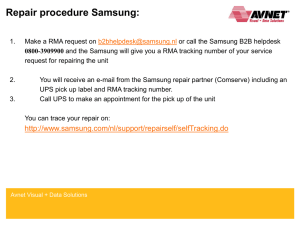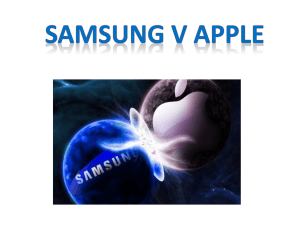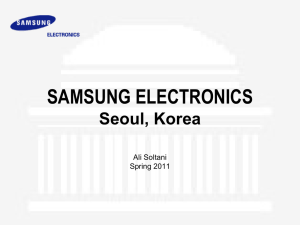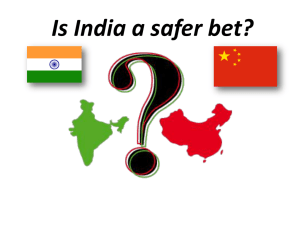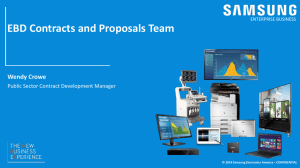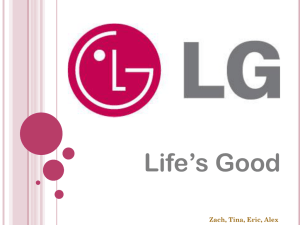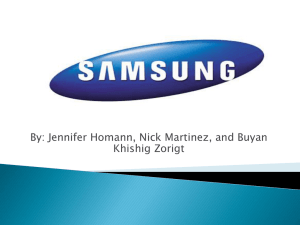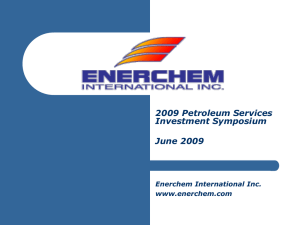Samsung Electronics is one of Samsung Group`s multinational
advertisement
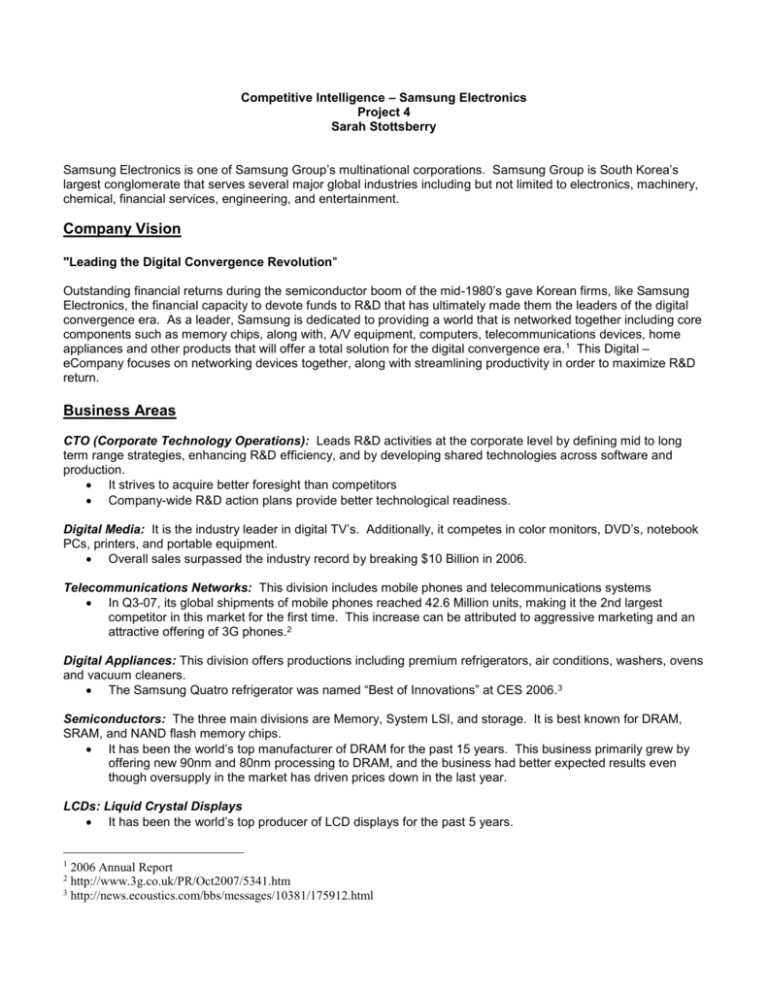
Competitive Intelligence – Samsung Electronics Project 4 Sarah Stottsberry Samsung Electronics is one of Samsung Group’s multinational corporations. Samsung Group is South Korea’s largest conglomerate that serves several major global industries including but not limited to electronics, machinery, chemical, financial services, engineering, and entertainment. Company Vision "Leading the Digital Convergence Revolution" Outstanding financial returns during the semiconductor boom of the mid-1980’s gave Korean firms, like Samsung Electronics, the financial capacity to devote funds to R&D that has ultimately made them the leaders of the digital convergence era. As a leader, Samsung is dedicated to providing a world that is networked together including core components such as memory chips, along with, A/V equipment, computers, telecommunications devices, home appliances and other products that will offer a total solution for the digital convergence era. 1 This Digital – eCompany focuses on networking devices together, along with streamlining productivity in order to maximize R&D return. Business Areas CTO (Corporate Technology Operations): Leads R&D activities at the corporate level by defining mid to long term range strategies, enhancing R&D efficiency, and by developing shared technologies across software and production. It strives to acquire better foresight than competitors Company-wide R&D action plans provide better technological readiness. Digital Media: It is the industry leader in digital TV’s. Additionally, it competes in color monitors, DVD’s, notebook PCs, printers, and portable equipment. Overall sales surpassed the industry record by breaking $10 Billion in 2006. Telecommunications Networks: This division includes mobile phones and telecommunications systems In Q3-07, its global shipments of mobile phones reached 42.6 Million units, making it the 2nd largest competitor in this market for the first time. This increase can be attributed to aggressive marketing and an attractive offering of 3G phones.2 Digital Appliances: This division offers productions including premium refrigerators, air conditions, washers, ovens and vacuum cleaners. The Samsung Quatro refrigerator was named “Best of Innovations” at CES 2006. 3 Semiconductors: The three main divisions are Memory, System LSI, and storage. It is best known for DRAM, SRAM, and NAND flash memory chips. It has been the world’s top manufacturer of DRAM for the past 15 years. This business primarily grew by offering new 90nm and 80nm processing to DRAM, and the business had better expected results even though oversupply in the market has driven prices down in the last year. LCDs: Liquid Crystal Displays It has been the world’s top producer of LCD displays for the past 5 years. 1 2006 Annual Report http://www.3g.co.uk/PR/Oct2007/5341.htm 3 http://news.ecoustics.com/bbs/messages/10381/175912.html 2 It owns one of the largest and most advanced LCD glass factories in the world. Since it is a leading vendor in the TV arena, it has been able to strengthen its engineering skills in the fabrication of electronic devices that use LCD. In Q3-07, Samsung surpassed Dell in shipments of LCD desktop monitors for the first time since Q4-01.4 Core Competencies Streamlined R&D Processes It runs approximately 50 research projects per year. Company-wide mandate requires 20 new products by the year 2010.5 In 2005, Samsung partnered with Microsoft to help streamline its development process by using Microsoft’s project management solution.6 It has developed “E-Process”, an established network between R&D, production, marketing, and customers. It registered more than 2400 patents in the US in 2006. Distinctive Technologies Due to price wars in the TV Industry, Samsung focused on customer needs by providing a distinctive collection of technologies including LCD, plasma, projection and CRT TV’s. Next generation technology was used to offer 1GB DRAM and 32Gb NAND Flash memory. The unique design of the SGH-P110 SmartPhone allows the user to choose between a PDA experience and a mobile phone experience at a moments notice.7 Marketing Brand shops and showrooms allow customers to experience products first hand in order to influence their purchase decision Samsung Experience Day in NYC’s Time Warner building has brought significant returns. In 2006, $55 Million can be attributed to 31% of the participants purchasing a Samsung product within a year of their visit.8 Cost Competitiveness Due to the slowdown of the global economy, Samsung realizes the need to streamline business and manufacturing processes in order to remain cost competitive. Increase in 51 and 68 DRAMS are helping to cut costs; allowing higher concentration on high value-add products such as mobile DRAM, Graphic DDR, and 8 gigabit single level cell type NAND flash chips. Speed to Market Registered 17,377 patents worldwide in 2006 Samsung has historically been dedicated to focusing on innovations that will add value to consumers. It focuses on 8-12 metrics that help it visualize and meet the needs of consumers. Some of these metrics include price premiums, how quickly they can design phones and get them into the hands of the consumers, asset allocation across projects, as well as new-product success ratios.9 Superior Supply Chain Management Ranked in the top 25 companies having superior supply chain management by AMR research. 10 Due to large, complex, global supply chains, Samsung employs supply chain management solutions to improve its operations in order to meet Six Sigma quality rating.11 Strategic Assets Brand Value: Brand value has increased from $3.1 Billion in 1999 to 16.2 Billion in 2006. 4 http://www.tgdaily.com/content/view/34877/117/ http://whitepapers.techrepublic.com.com/casestudy.aspx?docid=330363 6 http://whitepapers.techrepublic.com.com/casestudy.aspx?docid=330363 7 http://mobilementalism.com/2007/03/18/cebit-2007-samsung-sgh-p110-schizophrenic-phone/ 8 2006 Annual Report 9 www.pasbdc.org/idea/references/Innovation/BusinessWeekWorldsMostInnovativeCompanies.pdf 10 http://www.amrresearch.com/supplychaintop25/# 11 http://managers.emeraldinsight.com/quality/articles/samsung.htm?PHPSESSID=1aa5041090db23e2c704e67f568ff1cc 5 It officially made an agreement to be a sponsor for the 2010, 2012, 2014, and 2016 Olympic games, helping it to become a “cutting-edge global brand”12 Talented, Dedicated Employees It employs talented staff that can develop value-added products: 26% of entire workforce is in R&D amounting to 36,000 employees13 South Korean employees are extremely loyal to the company, working long hours, and no weekends or holidays. This is often the case until they retire. 14 Financial Summary Samsung has historically performed very well as shown in the graphs below. However, 2007 has reportedly been a challenging year for its semiconductor division. Sparked by oversupply and plummeting prices, semiconductor sales experienced a significant decline in the 4th quarter 2007 with a 9% drop in revenue. Overall performance for the fiscal year 2007 was better than expected due to higher than expected performance in its LCD division. While the semiconductor market is expected to gain momentum again, it is predicted to be a slow recovery as demand for the products begins to improve. Samsung will additionally focus on other divisions that can replace the revenue that has been a major area of profitability in the past. 15 2002 2003 2004 2005 2006 59,569 64,817 81,963 80,630 85,426 0.16 0.10 0.14 0.09 0.11 6,872 9,095 8,108 8,144 7,726 0.31 0.21 0.32 0.20 0.18 0.12 0.09 0.13 0.09 0.09 0.99 0.78 0.49 0.40 0.30 Earnings Per Share 42,011 36,376 67,916 49,969 52,880 Net Income (in Billions of KRW)16 7,053 5,962 10,790 7,640 7,926 Sales Operating Profit Margin Cash ROE Profitability(NI/Sales) Debt to Equity 12 13 2007 7,430 2008 FC 8,300 http://www.2010commercecentre.gov.bc.ca/news.aspx?articleID=149 2006 Annual Report 14 http://en.wikipedia.org/wiki/Samsung 15 http://www.cnbc.com/id/22655340 16 Most figures obtained from 2006 Annual report, along with news release regarding Q4 results and forecast for 2008: http://www.cnbc.com/id/22655340 2007 & 2008 Product Highlights 2007 May: Q1 Ultra Premium UMPC: It will be marketed to commercial groups as well as consumers that travel frequently 2007 July: Announced 3rd Generation Hi-Def players that support Blu-ray and HD-DVD discs, along with a new Home Theater System 2008 Consumer Electronics Show: Low Energy 31” OLED TV: This LCD is quite a bit larger than Sony’s 11 inch that it currently has on the market and Sony’s 27” that was prototyped at CES 2008. RTS-A1100 Media Center: 4.3 inch touch sensitive with IPOD looking interface giving the consumer the ability to burn media directly to disk. Samsung SC-HMX20C Camcorder: Offers the fasted and most versatile storage modes with 8GB Flash Memory, along with slot for expandable memory. Georgio Armani Phone: Stylish phone available in select mobile phone stores in the U.S. and Giorgio Armani boutiques in Europe. This phone is unique in that it vibrates to indicate a touch has been recognized on the touch screen. HT-X810 Home Theater Sound Bar: Offers integration with HDTV and some Bluetooth devices. 82” QuadHD & 50” Ultra Slim LCD: Joins Hitachi’s 52” Non-OLED display The Future Samsung Electronics will undoubtedly be a major player in convergence technologies during the next 5-10 years. It will rely on its core competencies enabling it to develop new and improved technologies that will support the road to digital convergence. There are 3 areas where I think it will likely concentrate its efforts. Interface and Display: The challenges of display technology will become increasingly challenging in the future, as mobile devices become smaller and the number of features increases. Samsung’s vice president of Next-Generation Terminals Team predicts cell phones offering flexible holographic displays, and the ability to take 3D holographic images will be available by 2010.17 Mobile Navigation Samsung is currently the main supplier for the components used in manufacturing the Apple iPhone. 18 While Apple has been coined as the industry leader in this technology, Samsung will likely take advantage of its own knowledge and expertise in these components and will offer a superior combination of technologies that could surpass the offerings of the iPhone as we know it today. Forrester Research, Inc offers some stunning statistics on emerging markets and computers. By 2015, it expects China to increase from 55 million to 500 million, the middle east and Africa are expected to reach 110 million.19 The iPhone and similar technology currently serves a luxury market, especially given its price at approximately $400. Samsung will likely focus their technological expertise, and innovative product design skills by offering affordable, internet capable phones that could ultimately reach this emerging market by 2015 and beyond. Technology Convergence and Memory In 2006 at the Seoul Digital Forum, Hwang Chang-gyu, president and CEO of Samsung’s semiconductor business, predicted that “Fusion Technologies” will break down barriers of industries such as Information Technology, Bio-Technology and Nano-Technology. The semiconductor industry is likely to support this shift by offering 20 Terabyte memory cards by 2015. 20 We will likely see additional advancements by Samsung in terms of memory devices in the next 5-10 years. Hwang Chang-gyu additionally gave some insight into the ultimate goal of the semiconductor industry; to match the memory density of the human brain. He predicts that 100 Terabyte memory chips will be available by 2030. 17 http://mobilementalism.com/2006/11/16/samsung-predicts-holographic-phones-by-2010/ http://sramanamitra.com/2007/07/09/iphones-components-and-samsungs-future/ 19 http://sramanamitra.com/2007/06/19/2-billion-convergence-devices-by-2015 20 http://www.kdcstaffs.com/it/main_view.php?mode=view&nNum=1187&parts=Special 18
